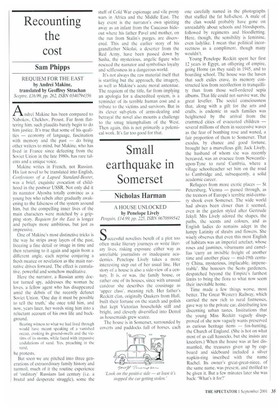Small earthquake in Somerset
Nicholas Harman
A HOUSE UNLOCKED by Penelope Lively
Penguin, £14.99, pp. 225, ISBN 0670899542
Successful novelists bereft of a plot too often make literary journeys or write literary lives, risking exposure either way as unreliable journalists or inadequate academics. Penelope Lively takes a more interesting step out of her usual line. Her story of a house is also a side-view of a century. It is, or was, the family house, or rather one of its houses, since with unusual candour she describes the cousinage as 'upper class', meaning rich. Her father's Reckitt clan, originally Quakers from Hull, built their fortune on the starch and polish that kept Victorian households stiff and bright, and cleverly diversified into Dettol as housemaids grew scarce.
The house is in Somerset, surrounded by coverts and paddocks full of horses, each one carefully named in the photographs that stuffed the fat hall-chest. A male of the clan would probably have gone on unreadably about schools and bloodsports, followed by regiments and bloodletting. Here, though, the sensibility is feminine, even ladylike. I mean that political incorrectness as a compliment, though many wouldn't.
Young Penelope Reckitt spent her first 12 years in Egypt, an offspring of empire, going Home (as they said) in 1945, and to boarding school. The house was the haven that such exiles crave, its memory constructed less from recollection in tranquillity than from those well-ordered sepia albums. That life could not survive war, the great leveller. The social consciousness that, along with a gift for the arts and crafts, is endemic in such families was heightened by the arrival from the crammed cities of evacuated children — several millions of them in successive waves as the fear of bombing rose and waned, a fair proportion of them to Somerset. That exodus, by chance and good fortune, brought her a marvellous gift: Jack Lively, the husband of whom she was recently bereaved, was an evacuee from Newcastleupon-Tyne to rural Cumbria, where a village schoolteacher set him on the road to Cambridge and, subsequently, a solid academic career.
Refugees from more exotic places — St Petersburg. Vienna — passed through, as the tremors of Europe's terrible mid-century shook even Somerset. The wide world had always been closer than it seemed, even in the garden styled after Gertrude Jekyll. Mrs Lively adored the shapes, the paths. the scents and colours, and as English ladies do remains adept in the lumpy Latinity of shrubs and flowers. She wisely observes that even this most English of habitats was an imperial artefact, whose roses and jasmines, viburnums and camellias 'carry an invisible freight of another time and another place — mid-19th century China, mysterious, implacable. impenetrable'. She honours the Scots gardeners, despatched beyond the Empire's furthest limits to bring the flora to what now seem their inevitable home.
Time made a few things worse, most better. The Great Western Railway, which carried the new rich to rural fastnesses, gave way to the private car, distributing less discerning urban tastes. Institutions that the young Miss Reckitt vaguely disapproved of she now vaguely wants preserved as curious heritage items — fox-hunting, the Church of England. (She is hot on what most of us call hassocks, but she insists are kneelers.) When the house was at last dismantled, the treasures given up by cupboard and sideboard included a silver napkin-ring inscribed with the name Rachel. Its owner's great-great-niece, of the same name, was present, and thrilled to be given it. But a few minutes later she was back: 'What's it for?'


























































 Previous page
Previous page